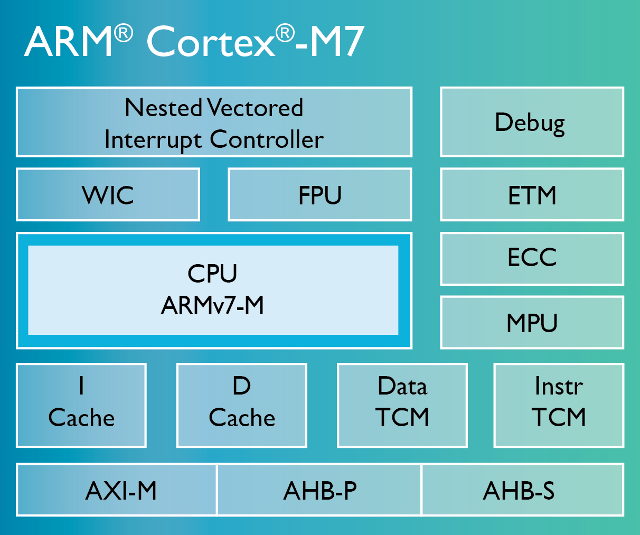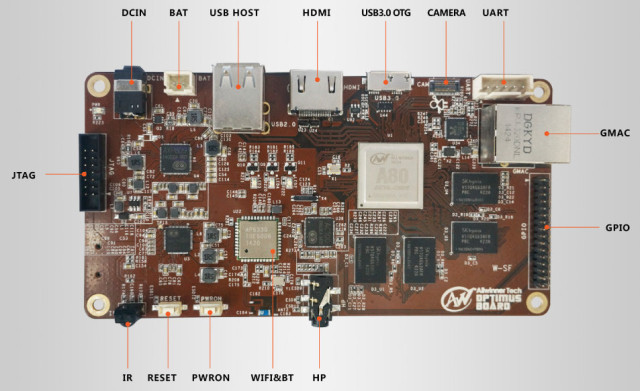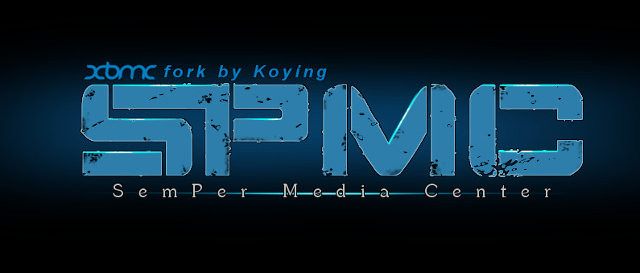Linaro 14.09 has just been released with Linux kernel 3.17-rc4 (baseline), Linux 3.10.54 & 3.14.19 (LSK), and Android 4.4.2 & 4.4.4. Linaro has kept working on their member boards such as IFC6410 (Qualcomm), D01 (Huawei/Hisilicon), Ardnale (Samsung), and Juno (ARM). They’ve also announced they’ll change the tools to build GCC by using cbuild2 instead of cbuild1 for next release, and they’ve enabled a build with gcov (for code coverage analysis) which may mean they’ll work on reducing the kernel size by getting rid off unused code. I’ve also noticed the Arndale and Arndale Octa Ubuntu images are now based on Linux LSK with Mali GPU support since last month. Here are the highlights of this release: Linux Linaro 3.17-rc4-2014.09 GATOR version 5.19 updated topic from Qualcomm LT (ifc6410 board support) and HiSilicon LT updated Versatile Express ARM64 support (FVP Base and Foundation models, Juno) from ARM LT. updated Versatile Express […]
ARM Introduces Cortex-M7 MCU Core for IoT, Wearables, Industrial and Automotive Applications
ARM has just announced Cortex-M7 processor based on ARMv7-M architecture, with double the compute and digital signal processing (DSP) capability of ARM Cortex M4. The latest ARM MCU core targets IoT and wearables applications for the automotive, industrial, and consumer markets including motor control, industrial / home / factory automation, advanced audio, image processing, connected vehicle applications, and so on. Cortex-M7 comes with enhanced DSP instructions, a better FPU (FPv5 with single and double precision support), and tight coupled memory compared to Cortex-M4, according to an Anandtech article. ARM Cortex-M7 also achieves 5 CoreMark/MHz against 3.41 CoreMark/MHz for Cortex M4, and up to 3.23 DMIPS/MHz against up to 1.95 DMIPS/MHz. ARM Cortex-M7 features listed in the press release: Six stage, superscalar pipeline delivering 2000 Coremarks at 400MHz in a 40LP process. AXI interconnect (supports 64-bit transfer) and fully integrated optional caches for instruction and data allowing efficient access to large […]
Linaro 14.08 Release with Kernel 3.16 and Android 4.4.4
I’m a little late for that one, as Linaro 14.08 was released last Thursday. Nevertheless, this release features Linux kernel 3.16 (baseline), Linux 3.10.52 (LSK), and Android 4.4.4. As usual Linaro has worked on member hardware such as Qualcomm based IFC6410 and ARM Juno &Vexpress boards. They’ve also committed changes for LLVM, big Endian, and added a workload generator tool (rt-app) to the Ubuntu and Android image. This tool has been developed and used by the power management working group, presumably to measure and optimize power consumption under various loads. Here are the highlights of this release: Linux Linaro 3.16-2014.08 GATOR version 5.19 (new version) updated topic from Qualcomm LT (ifc6410 board support) updated Versatile Express ARM64 support (FVP Base and Foundation models, Juno) from ARM LT (Landing Team) updated Versatile Express patches from ARM LT updated LLVM topic (follows the community llvmlinux-latest branch) Big endian support (the 2014.05 topic […]
Embedded Linux Conference Europe 2014 Schedule – IoT, ARM vs x86, Optimization, Power Management, Debugging…
The Embedded Linux Conference Europe (ELC 2014), CloudOpen, and LinuxCon Europe will jointly take place at the Congress Centre Düsseldorf, in Germany on October 13 – 15, 2014. The 3-day events will consists of keynotes, presentations, and tutorials. Each day will open with two or three keynotes by speakers including Jim Zemlin (Executive Director, Linux Foundation), and Jono Bacon (XPRIZE), followed by presentation and tutorials. There will be 45 presentations for ELCE, 58 for LinuxCon, and 47 for CloudOpen, I’ll make a virtual schedule with a few sessions part of the Embedded Linux Conference Europe “track”. Monday, October 13 11:15 – 12:05 – Performance Analysis Using the Perf Suite by Mans Rullgar, Consultant When faced with a performance problem, the initial steps towards a solution include identifying the sections of code responsible and the precise reasons they are time-consuming. To this end, the ‘perf’ profiling tools provide valuable insight into the […]
AllWinner A80 OptimusBoard Octa-core big.LITTLE Development Board is Now Available … for $169
A80 OptimusBoard powered by AllWinner A80 octa-core processor with four Cortex A15 and four Cortex A7 in big.LITTLE configuration had been announced at the end of 2013, and after numerous delays, several boards have recently been sent to developers and companies such as miniNodes, Linuxium, and others. The company behind the board is actually Shenzhen Merrii Technology (aka WITS), which had done all earlier development kits for AllWinner, and they’ve now made the board available for purchase on Aliexpress. Unfortunately the company has decided to leave to low cost development boards market to the likes of Cubieboard8 and PCDuino8, as A80 OptimusBoard sells for $345 plus about $30 for shipping by courier.[Update: they now offer it for $169] SoC – AllWinner Ultra Core A80 4x Cortex 15, 4x Cortex A7 big.LITTLE processor with Imagination Technologies PowerVR GC6230 GPU with 64-cores, and support for OpenGL ES 1.1/2.0/3.0, Directx 9.3 System Memory […]
MYIR ARM9 Linux Development Boards & Computer-on-Modules Powered by Freescale i.MX28 Processor
MYIR MYD-IMX28X development boards and MYC-IMX28X CPU modules had been announced in May 2014, but I’ve just found out about them via the company’s newsletter. The CoMs are powered by Freescale i.MX28 ARM9 processors (i.MX283 or i.MX287), feature 128 MB RAM, 256 MB Flash, and connect to a baseboard to make the development boards. Target applications include smart gateways, human-machine interfaces (HMIs), handheld devices, scanners, portable medical, experimental education as well as other industrial applications. MYC-IMX28X CoMs MYC-IMX28X computer-on-module specifications: Processor – Freescale i.MX283 or i.MX287 ARM926EJ-STM processor up to 454MHz with 128KB SRAM, 128KB ROM, 1280 bits of OCOTP ROM, 16KB/32KB I and D Cache System Memory – 128MB DDR2 SDRAM Storage – 256MB NAND flash, 128KB SPI flash Connectivity – On-board Ethernet PHY Connectors – 2x 1.27mm pitch 2 x 40-pin SMT male expansion connectors with access to Ethernet – Up to 2 Ethernet (two for i.MX287, one for i.MX283) USB […]
SPMC is a Fork of XBMC Available on Google Play Store, Amazon AppStore
XBMC 13, released a few months ago, is the first official release to support hardware video decoding on many ARM based Android devices. However, although both XBMC Android apks for ARM and x86 can be downloaded from xbmc.org, Team-XBMC have decided not to publish XBMC for Android on app stores such as Google Play, partially because video hardware decoding is not yet fully working on all popular Android SoC platforms and devices, but also because of the upcoming name change from XBMC to Kodi. Since the code is open source under GPLv2, anybody can build it, and somebody published XBMC on Android as a paid app, which would have been legal if they changed the name, but as they used XBMC trademark, it has been removed since then. Seeing this, Chris Browet (Koying), one of XBMC developer, decided to fork XBMC, apply some patches not yet approved in mainline XBMC, […]
Linux 3.16 Released
Linus Torvalds announced the release of Linux Kernel 3.16 over the week-end: So nothing particularly exciting happened this week, and 3.16 is out there. And as usual (previous release being the exception) that means that the merge window for 3.17 is obviously open. And for the third time in a row, the timing sucks for me, as I have travel coming up the second week of the merge window. Many other core developers will be traveling too, since it’s just before the kernel summit in Chicago. So we’ll see how the next merge window goes, but I’m not going to worry about it overmuch. If I end up not having time to do all the merges, I might delay things into the week of the kernel summit, but I’ll hope to get most of the big merging done this upcoming week before any travel takes place, so maybe it won’t come […]







